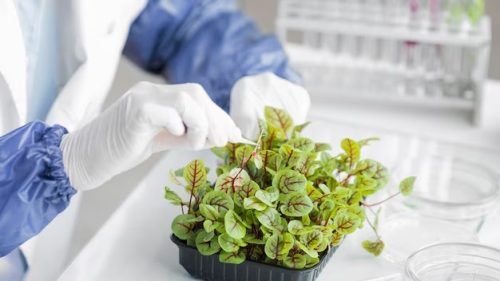
Plant Mediated Green Synthesis of Metal Based Nanoparticles: Biocompatibility, Applications and Challenges
Engineering the Future with Green Nanotechnology
The “Plant Mediated Green Synthesis of Metal Based Nanoparticles” program introduces the eco-friendly approach to nanoparticle synthesis, which utilizes plant extracts as reducing and capping agents. This method not only provides a green alternative to traditional chemical synthesis but also enhances the biocompatibility of the nanoparticles, making them suitable for biomedical and environmental applications. Over one month, participants will delve into the mechanisms of plant-mediated synthesis, study different metal nanoparticles, and their unique properties.
Aim: This program seeks to explore the innovative field of green synthesis of metal-based nanoparticles using plant sources, emphasizing their biocompatibility, applications, and the challenges involved. Participants will learn about environmentally friendly nanoparticle production methods, their potential in various industries, and the importance of sustainable practices in nanotechnology.
Program Objectives:
- Understanding Green Synthesis
- Knowledge of Plant Species and Extracts
- Synthesis Techniques
- Nanoparticle Characterization
- Biocompatibility and Toxicity Assessment
- Exploration of Applications
- Addressing Challenges and Future Directions
What you will learn?
Module 1: Introduction to Nanotechnology, Nanoparticles, Green Nanotechnology and Green Synthesis
- Introduction to plant mediated green synthesis of MBNPs
- Advantages of green synthesis over other synthesis methods
- Advantages of plants over other biomaterials in green synthesis
- Taxonomic and evolutionary aspects of plants for setting the guidelines of plant selection
- Introduction to different chemical and physical methods of nanoparticle synthesis
- Selection of plants & plant parts, authentication and processing of plant samples
- Selection of extraction method and solvent (aqueous or organic)
- Synthesis methods of MBNPS
- Purification and harvesting of MBNPs
- Size, shape and surface properties of nanoparticles with special reference to surface plasmon resonance (SPR).
- Instrumental analysis (UV-Vis spectrophotometer, Zetasizer, FTIR, SEM, TEM, XPS, CD) of MBNPs.
- General mechanisms (bio-reduction of metallic cations)
- Special mechanism (case studies)
- Unexplored avenues
Module 2: Biocompatibility and Applications Aspects of Plant Mediated Green Synthesized Metal Based Nanoparticles
- Plants have big role in conferring biocompatibility
- The purity of MBNPs influence the biocompatibility
- Cytotoxicity studies
- Cellular Responses to MBNPs, Metal Homeostasis
- Biocompatibility of MBNPs and Epigenetics
- Biocompatibility versus Nanobiocompatibility, application of QSAR & IMA
- Studies with Animal Models, pre-clinical and clinical studies
- A generalized view of diverse applications of MBNPs
Module 3: Practical Applications, Challenges and Regulatory Aspects of Plant Mediated Green Synthesized Metal Based Nanoparticles
- Case studies with reference to Biomedical, Environmental and Agricultural Applications
- Success Stories of MBNPs application
- Challenges in the application of MBNPs
- Emerging Trends and Future Directions in the Field
- Setting of regulatory guidelines as National level
- Collaborative Research Opportunities and Funding Resources
Intended For :
- Undergraduate degree in Environmental Science, Chemical Engineering, or related fields.
- Professionals in the energy sector or agricultural industries.
- Individuals with a keen interest in renewable energy and sustainable practices.
Career Supporting Skills
